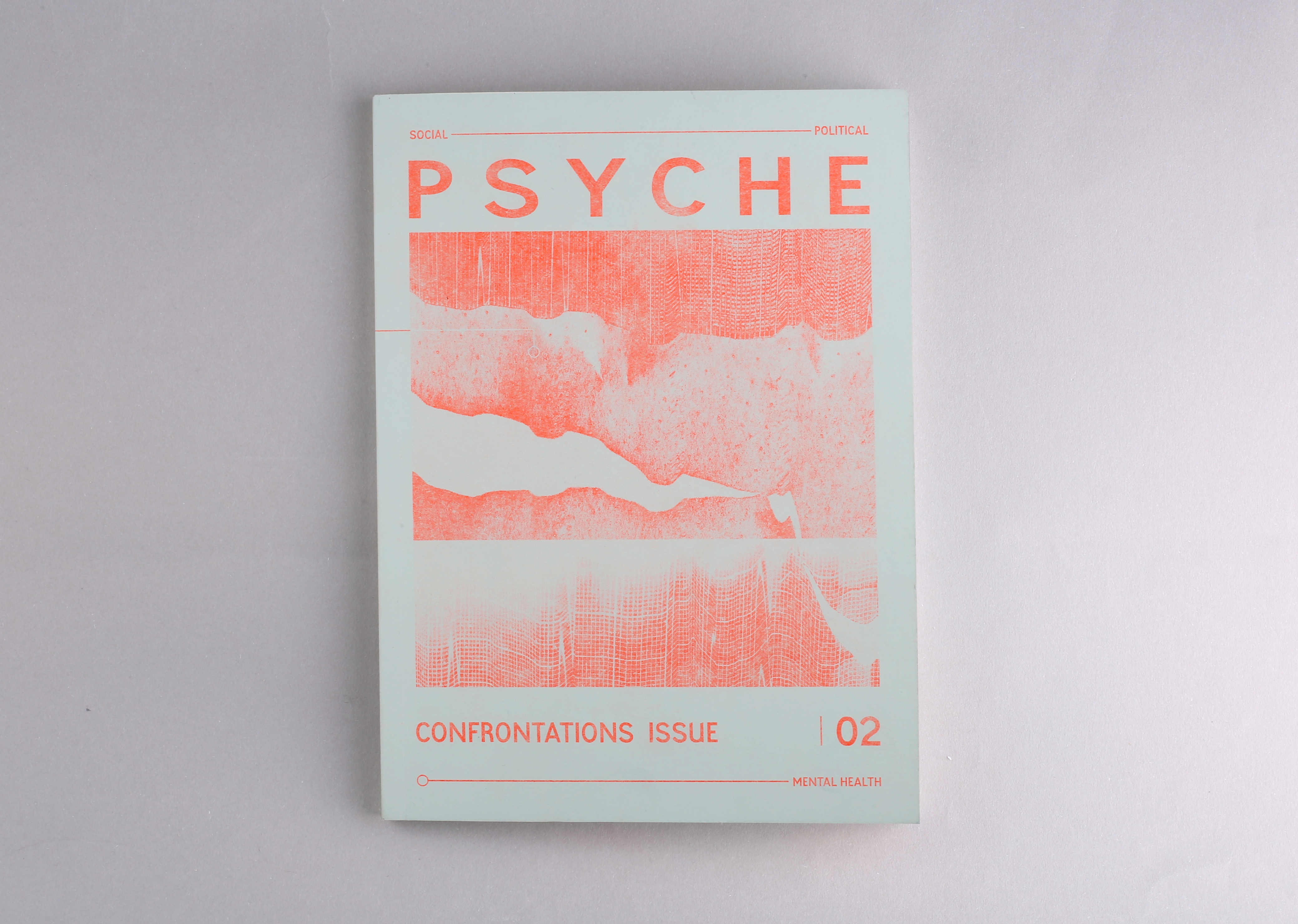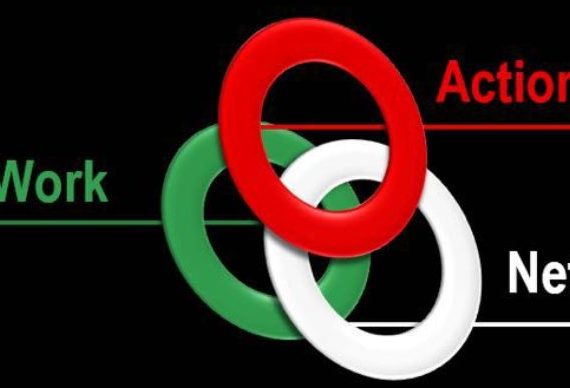Lucy Grainge and Juliette Duffy are setting out to create a new type of magazine…one based on engaging with the therapeutic and transformative nature of storytelling, centred on mental health and politics. The latest issue is titled CONFRONTATIONS. We interviewed Juliette to discuss what role art and storytelling can have in empowering people.
What made you start Psyche?
We started Psyche as a collaborative project in our final year studying Communication Design at the Glasgow School of Art. I had been working on zines exploring philosophy, psychology, politics and themes relating to the human condition. Lucy was focusing on illustration and word play, exploring cognitive learning processes with a particular interest in Dyslexia and different learning styles from linear/non linear to visual and numerical. We were both keen to take on larger editorial projects and felt there was a cross over in subject matter and interests – it seemed obvious that if we teamed up we could make a publication that was more sophisticated than any zine we could make independently.
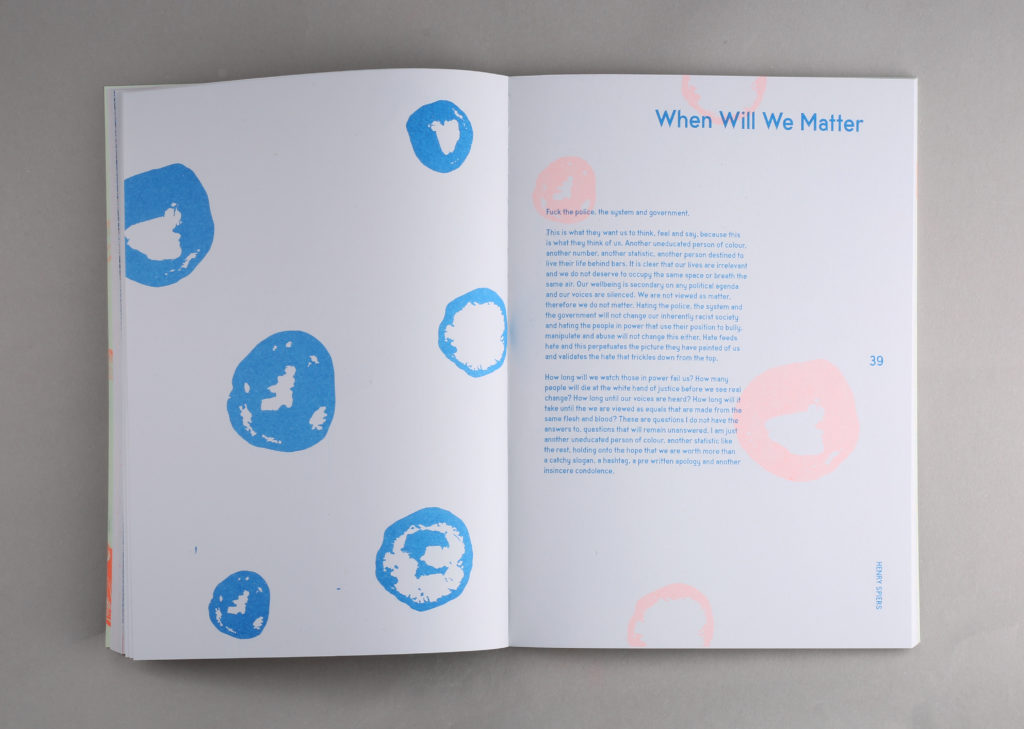
Mental health/ill-health among students has become such an urgent issue, do you think having more student and issue-based publications can challenge the structures at universities and colleges?
I think more platforms and voices are always a positive presence on campuses. From our experience there wasn’t much in terms of publishing within GSA, from the student population or the institution. There was more of a focus on illustration or photography, and we felt the lack of written publications didn’t reflect the amount of students who used writing as part of their practice. So we created a space that gave students a chance to submit creative and academic writing to discuss issues impacting their lives and student experience. What came of this tended to be personal experiences, often relating to mental health, and ultimately inner worlds.
I think student based publications can be an effective way to galvanise, communicate and capture the feelings of a student population at a point in time. I suppose printed matter is in a sense more permanent than certain types of protest. Schools/universities are feeling more like businesses, which should not be the case, and has a huge knock on effect. As a class we spent much of our last year trying to gain better workshop access and affordable printing facilities at GSA. There are multiple ways of challenging university structures, but yes, we believe student-led publications are one way of doing this.
It is so important to have writing in circulation that has an opinion and takes a stance, has something to stand for. Not just the safe functional institutional information dissemination – which are often beautiful and fit for their purpose, but that wasn’t where our interests lay. We wanted to make something that had no set discourse, but rather it would be driven by the thoughts that were the most pressing to our contributors.
Art is such a great communicator of oppression and struggle, what do you think can help bring more voices in the creative industry and do you think women’s oppression is being addressed?
It’s interesting that you’ve focused on the female run aspect. As we did have this conversation early on. We never wanted Psyche to come across as a women’s magazine or a purely feminist publication. (Fem Soc existed in GSA at this time – their zine was more imagery and some poetry), as we didn’t want anyone to be discouraged or feel excluded. We wanted people of all lived experiences, of all identities to feel they could engage with our project. As this was the only way that we can get an honest picture of the issues impacting our peers.
I think, sometimes, when these spaces are created as ‘queer’, ‘feminist’, ‘socialist’ – although we absolutely are all of these things – it can be off putting to those who are just curious or don’t necessarily identify with the given labels for the context yet/or who choose not to. So we wanted to avoid labels and to focus on individual inner worlds and lived experience which ultimately would lead people to discuss class, gender, race but that didn’t demand it of people, or to demand that a contributor had to be well read or educated on these matters. We wanted it to be a space for people to be honest and to learn from each other through storytelling.We wanted people to talk about their inner worlds and the outer world that shaped it, or in other words the socio-political conditions that shape the experience of every individual. We did not want to hold people to standards that were too high, and avoid the judgemental mentally of cancel culture which is all too prevalent in the creative industries at present.
And the other side of this was the fact that Lucy and myself (Juliette) were just learning through doing – we were not claiming to be an academic authority on any of the the subject matter but we were interested and curious and wanted to open up the conversation about things we knew were important.
As for our experience as women in the creative industry, evidently it is still male dominated, particularly graphic design, yet art schools have always had a larger female student population. Which makes you wonder where all these art school educated women disappear to after graduation. All too often women in the creative industry aren’t taken seriously, revealing an insidious misogyny that is still alive and well in areas of the industry. However, there has always been and continues to be women challenging this bias, from the all girl collectives focusing on women in art, design and the music industry, and initiatives such as the famous Gorilla Girls, to the hey52GIRLS and Girls Rock Glasgow. Women in the industry tend to take matters into their own hands, we have so many friends and peers starting exciting projects and platforms to create supportive environments or act as inspiration for female creatives, such as Ladies Wine and Design, VAJ power, & magazine, Colab Collective, and illustrators such as Laura Callaghan and Nanni-Paa who explore what being a woman today means.

Your latest issue of Psyche was based on ‘confrontations’, what was the basis to this?
Honestly, with all the Brexit debates, tumultuous political landscapes with UKIP, the DUP, Anti-immigration sentiments radiating from the media, Lucy and I felt a tone of hostility across our outer social political landscape. We wanted to take the obvious political world idea of conflict and confrontations and stretch this to be interpreted as broadly as people desired. So instead of just conflict and confrontations in terms of verbal debate, antagonism and violence – it could be explored in terms of confronting personal beliefs, or confrontation in relationships, as well as physical confrontations or opposing societal expectations.
We felt that after our pilot issue, that had no specific theme, it would be good to confront ideas that could be divisive in our second issue.
You have tried to bring together a vast range of contributors, including social workers. What do you think social work can learn from art/artists?
My perception of social work – having a few as close friends and family members – I understand that the relationship you can build with clients is the most important aspect of making a positive change in their lives. Hence why the job is often emotionally exhausting and even traumatising. Often when communication breaks down, or if it is hard to establish, creative outlets can offer a way for people to express themselves, particularly vulnerable individuals. I think protecting creative activities, whether visual art or music or writing, as well as the performance arts is so so imperative for well-being.
The societal structure of the state that determines our means of education operates on such a linear formula that excludes so many learning styles and therefore fails many individuals. I think it is criminally counterintuitive to impose harsh cuts on creative education/industry funding.
Neville Brody articulates this very well regarding how misguided the attitude towards the value of creative education – I also feel this is applicable to social care.
‘It’s neanderthal. This current government are studying Victorian models and they believe in the mechanisation of society, which means that everyone has a place and a cog… and this is the way they keep the status quo. It’s about funneling funds from the poorer to the richest. They don’t want to educate a freewheeling proletariat. You have to keep the factory running.’[1]
It is incredibly short sighted to leave art out of education and social care.
I think given the categorical need for human connection in social work, art should be a go-to in terms of fostering communication and expression. Art exists once all of our basic needs have been met, hence why it is a product of our higher selves and can be a transformative and healing force.
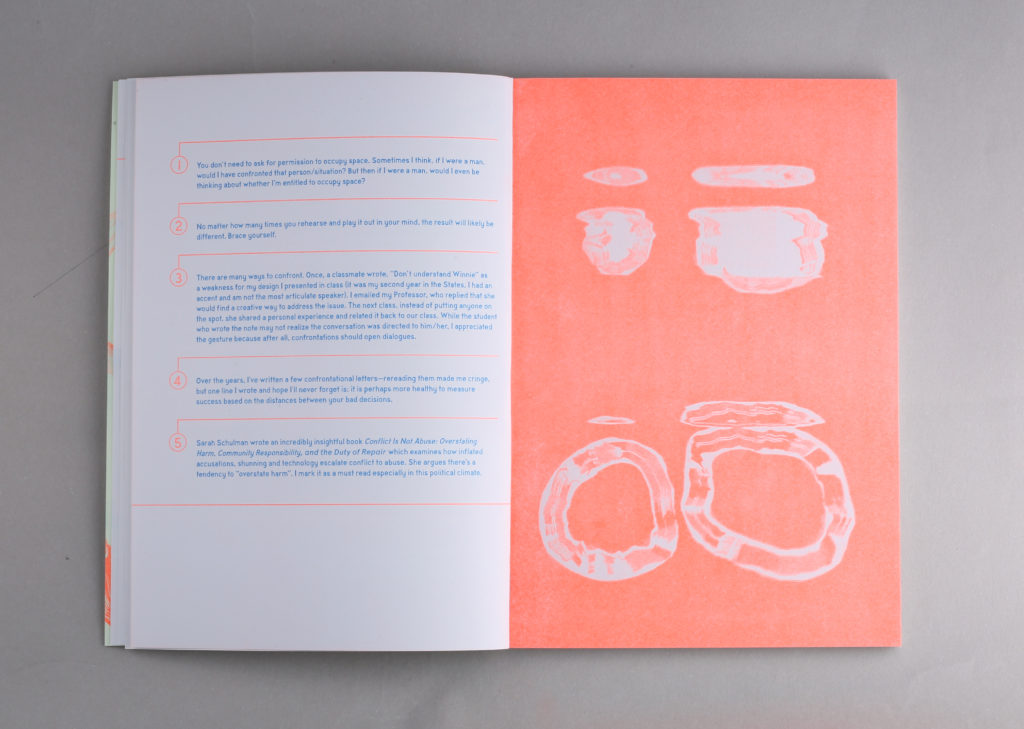
I really enjoyed seeing a serious magazine finished in a really creative way that didn’t lose the content, do you think professionalism can hinder the artistic process?
Perhaps, in the sense that a magazine is such a familiar format that there’s already such defined expectations on what a magazine should look like. Very early on we realised we could not or did not feel comfortable illustrating other people’s experiences, so we decided that our illustrations throughout, would be our reaction to the theme. This instantly creates a different feel to the usual format of a magazine, where there will be a number of different illustrators and visual styles throughout.
Creating Psyche independently also means we don’t have any set rules for it and are often questioning how it could evolve and change. Coming from an illustration and graphic design background the design and aesthetic is very important to us and a great source of fun.
What other projects have influenced Psyche?
Lucy and I are big fans of all things printed matter. Many current mags and independent books have influenced us both visually and conceptually. We would like to give a notable mention to a few mental health mags we really admire – Anxy, Ladybeard and NOUS. All of which explore the intersections of the mind, culture and society in unique, insightful and beautifully designed ways.
Social Work is in a crisis at the moment due to austerity and cuts to services, creative spending has seen a reduction also. What does the future hold for sustainable arts projects?
The future is uncertain as funding cuts can put crippling pressure on great initiatives, social enterprises and small independent projects. Lucy earns a portion of her living working in community based initiatives such as Impact Arts, a community arts organisation which uses the arts and creativity to enable and empower social change. She recently had to leave the project she was on as the funding was not there this year for her role. So these organisation’s are forced to downsize, meaning staff lose their jobs and fewer members of the community can reap the benefits of the service. Though on a positive note – Impact Arts have recently secured funding for many more great projects they run.
Lucy works across projects with young people and most recently with the Craft Café in Govan, which is a community group for over 65’s who meet to do a range of arts and crafts. The Craft Cafe offers support to members of the elderly community, who may be suffering from alienation and loneliness and has become a much loved social hub. These projects also create spaces where people come together, who then go onto create more community initiatives and share further events happening in the local area. At the launch of our issue 2, we had Annie from the Craft Café speak about loneliness in older people. Annie spoke of the Craft Café saving her life after a period of instability. Through the support of the tutors at the Craft Café she has gone on to hold talks at Kinning Park Complex and the Scottish Socialist Party about Climate Change. She also started the Befriending Food Service, where Annie and her partner Sonny, visit isolated older people – some of whom haven’t left their homes in months – to cook for them, and have hosted multiple community group meals.
As for small independent projects like Psyche, funding comes in many forms. We have relied heavily on crowd funding through Kickstarter, some funding from non-profits that support eco friendly and sustainable projects, and support through advertising in the magazine as well as sponsorship and discounted costs for things like paper through GF Smith. Our printing costs were also discounted as part of the Creative Scotland under 25’s funding of Out of the Blue Print.
It would not have been possible without crowd funding though, which not only raised funds for printing, it raised our profile and outreach. We hope as each issue goes on we will become more financially independent but for now we could not do what we do without the generosity of organisations and individuals. In short we haven’t cracked a sustainable model yet, but finding help from multiple sources and letting the financial challenges test our creativity is the way we persevere.
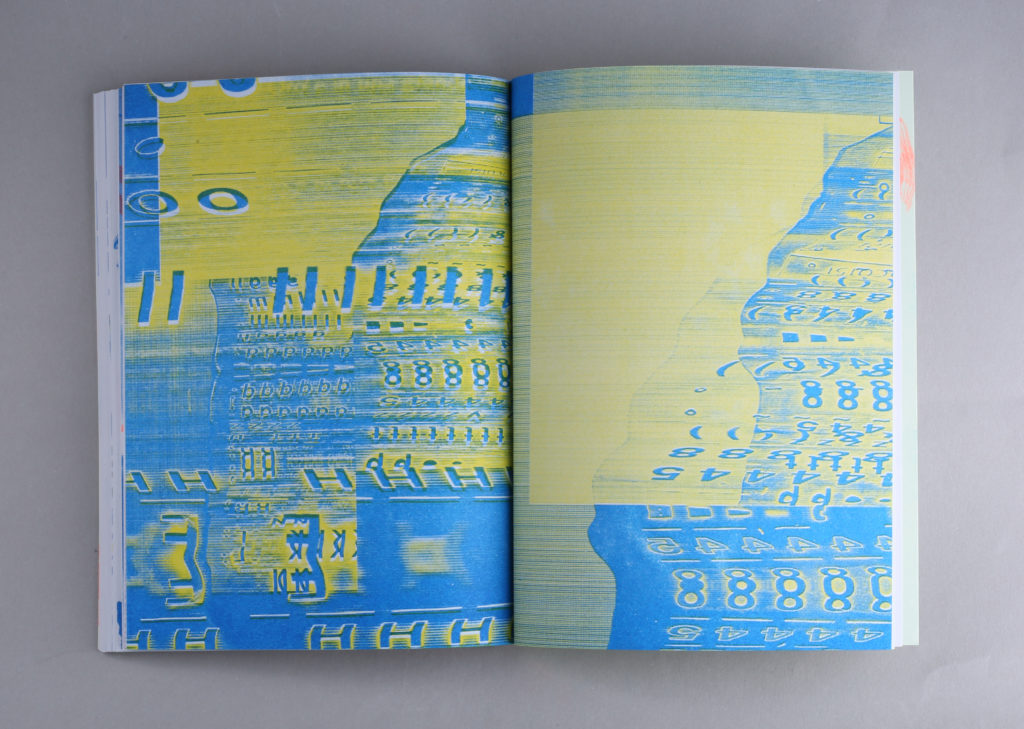
There has been massive movement around Extinction Rebellion, which has seen people paint messages on public spaces. Does public protest art need to resurface?
Yes, I am all for politicised public spaces, there’s an energy that builds momentum in struggle when we engage in public spaces. Public spaces are so commercial and watered down. I am keen to see authenticity and a public voice that reflects the lives of the individuals making the art. So yes, I want to see more public protest art. It’s all about communication and expression ultimately – which is why we wanted to make a platform for these sorts of things. There isn’t much difference between publishing papers or painting on walls in terms of the dissemination of an idea.
What’s the future for Psyche?
We’re still very much in the slower period after the second issue, taking some time off to reflect and enjoy the summer. We worked on issue 2 alongside our full time work, for around a year and half. It was pretty full on for both of us. Moving forward, it is essential for us to find a way to make Psyche sustainable in every sense – financially, time wise and even emotionally, as burn out has been a reality for us both.
We’ve had a great response from the second issue so far with lots of messages of support, encouragement and people telling us they have connected to Psyche in a way which makes it all worth it. With creating a magazine, there is always something to do and now we need to try and get it out there in stockists etc. Our second issue sold out in Printed Matter, New York, and they are already wanting to restock and take it to NY Art book Fair. With the power of instagram we have realised the scope of how far away you can reach an audience, we have been posting Psyches all over the world which is so exciting and only proves the universality of the themes within. It’s great to see how something that started as a Glasgow student zine can have an impact on an Australian, American or a Portuguese audience.
Next we will be thinking about the theme of issue three. We’d love to host more events and bring the platform into a physical space more often. Just now I am based in London and Lucy in Glasgow, this brings challenges and opens up new opportunities to have two cities as a base. So we will have to see what happens!
Website: http://www.psychepublication.com
Instagram: https://www.instagram.com/psychepublication/?hl=en
